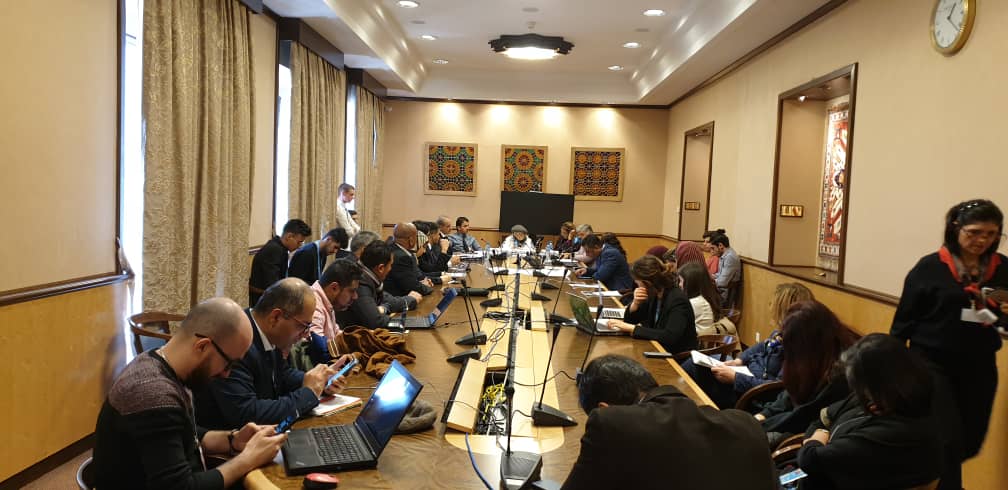فيس بوك
جوجل بلاس
تنفيذي الإصلاح بالمحويت ينعى القيادي الداعري أحد رواد التربية والعمل الاجتماعي
طلابية الإصلاح بحضرموت تنظم أمسية شبابية «لبناء جيل واعٍ ومدرك للقضايا الوطنية والعربية»
رئيس الهيئة العليا للإصلاح يتصل للاطمئنان على الشيخين الزنداني وصعتر
الرئيس العليمي يطمئن على الشيخ صعتر عقب نجاته من تفجير ارهابي غادر ويشيد بمواقفه المشرفة
رئيس الهيئة العليا للإصلاح يعزي سلطان عمان وأسر ضحايا السيول
حضرموت.. الإصلاح بسيئون ينظم العواد السنوي للشخصيات الاجتماعية والسياسية
الأمين العام المساعد للإصلاح يقدم واجب العزاء في استشهاد أبناء هنية
الإصلاح بحضرموت يدعو إلى تفعيل الأجهزة الرقابية والعمل النقابي والمهني
الجرادي: النظام الجمهوري بالنسبة لليمنيين انعتاقاً من نظام العبودية والكهنوت وإدعاء التمييز الإلهي
الإصلاح يدين بشدة استمرار جرائم الاحتلال الصهيوني في غزة ويعزي في استشهاد أبناء هنية

The Yemeni Coalition for Monitoring Human Rights Violations (YCMHRV) confirmed that the war waged by the Houthi militia following its coup against the legitimacy in 2014 produced tragic conditions at the humanitarian level, causing big damage to the physical and human capital, internal and external displacement of Yemenis and the emigration of talented people and distrusting the future of the economy.
In a paper presented by him in the symposium held by the Yemeni Coalition for Monitoring Human Rights Violations on the sidelines of the 40th session of the Human Rights Council in Geneva entitled "The economic and humanitarian situation in Yemen", the human rights activist Mansour al-Shaddadi said, "The war waged by the coup Houthi militia resulted in the loss of nearly 70% of gross domestic product of the country. Trade has declined completely and domestic and foreign investment remains non-existent except in some liberated areas, in which the domestic and foreign investment is slowly returning amid fears of a return of the conflict.
He added that "the Houthi militias have been living on the account of citizen's suffering and stealing his right to life, education, security and living, pointing out that the Houthi militia stole most of the aid reaching the areas controlled by it and turned it into a war effort and a tool for recruitment.
He pointed out that the Houthi militia is working to politicize and use humanitarian aid by controlling the mechanism of distributing aid, as well as forcing humanitarian organizations to coordinate with it for internal and external political goals. He stressed that the international community is ignoring the tampering of Houthi militias in the theft of humanitarian aid.
He explained that the Houthi militia detained 65 ships between the period 2015 to 2018, the bombing of 4 trucks and the recording of 16 incidents of attacks on the organizations of the United Nations and their workers. These attacks varied between killing, kidnapping and the closure of offices by force, noting that 80% of the United Nations relief comes through the port of Hodeidah, which is under the control of the Houthis.
In her paper entitled "The economic situation in Yemen before and after the coup," the academy, Dr. Wissam Basendwa, said: "The war that took place in Yemen after the militia coup against the legitimacy in 2014 reflected on the economic situation because of its control over most of the state's resources and its refusal to fulfill its obligations and not to supply these resources to the Central Bank, which was transferred to Aden to enter within the state budget."
She added, "The economic crisis caused by the militias has caused the flight of owners of capital, the depreciation of the currency, the rise in the unemployment rate, the damage of many vital facilities such as electricity, oil and others," noting that poverty in Yemen rose from 42% in 2014 before the coup to 78.8% in 2017 and reached about 85% in 2018.
Basendwa explained that Yemen's 2017 economic indicators report indicates that 85% of the population lives below the poverty line, noting that the number of people needing humanitarian assistance in 2018 is about 22 million. And there are 6 out of 10 people suffering from food insecure.
"The Houthi militia has not paid staff salaries since September 2016 until January 2019. Salaries of employees in the liberated governorates are regularly disbursed," she said.
She noted the efforts of the King Salman Center for Relief and Humanitarian Affairs, which carried out 217 projects in Yemen at a total cost of over 900 million US dollars until March 2018. The Saudi grant for oil derivatives estimated at 62 thousand tons of diesel and 25 thousand tons of mazout were distributed on ten Yemeni governorates.
Chairman of Tamkeen Development Foundation and Human Rights and a member of the Yemeni Coalition Murad al-Garati stressed that the war waged by the Houthi militia caused the disruption of economic activities, exacerbated the economic and social crisis and caused great suffering to the people in different governorates, pointing to the need to adopt treatments for the situation and the creation of economic and social policies and strategies working to address the effects of war, especially at the humanitarian level.
He reviewed the actions of the militia represented in the bombing of food stores, the looting of relief aid coming to the port of Hodeidah and the policy of starvation followed by it, pointing to the siege of the city of Taiz by the militia for more than four years and the difficulty of economic circumstances made by it.
He stressed that the war caused a decline in employment opportunities for both men and women as a result of the destruction of infrastructure and the situation became worse after the siege as a result of the stop of a number of projects and the closure of some others and the abandonment of a large proportion of employees of the other.